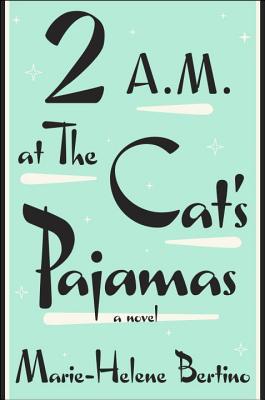 Light books with ensemble casts of kooky characters seem to be all the rage recently, and this one is no exception. Since I read Where'd You Go, Bernadette recently, this book reminded me immensely of that. It's a book with a child as the main character, even though the book is for adults, and the child gets up to all kinds of trouble when the parents aren't looking. In Bernadette, it was fourteen/fifteen-year-old Bea who got into trouble trying to solver her mother's disappearance; in this one, it's nine-year-old Madeleine trying to fulfill her dream of being a jazz singer. Madeleine is described by Bertino as "a jerk," and consequently doesn't have any friends. Most of the people who associate with her in the book are the adults who have stepped in to care for her following her mother's death and her father's descent into a prolonged depression in which he does nothing but listen to old jazz records. Madeleine goes to school by herself, eats at a cafe down the road by herself, gets her hair done by herself, and ultimately decides to find The Cat's Pajamas, one of Philadelphia's jazz clubs, by herself so that she can make her onstage debut.
Light books with ensemble casts of kooky characters seem to be all the rage recently, and this one is no exception. Since I read Where'd You Go, Bernadette recently, this book reminded me immensely of that. It's a book with a child as the main character, even though the book is for adults, and the child gets up to all kinds of trouble when the parents aren't looking. In Bernadette, it was fourteen/fifteen-year-old Bea who got into trouble trying to solver her mother's disappearance; in this one, it's nine-year-old Madeleine trying to fulfill her dream of being a jazz singer. Madeleine is described by Bertino as "a jerk," and consequently doesn't have any friends. Most of the people who associate with her in the book are the adults who have stepped in to care for her following her mother's death and her father's descent into a prolonged depression in which he does nothing but listen to old jazz records. Madeleine goes to school by herself, eats at a cafe down the road by herself, gets her hair done by herself, and ultimately decides to find The Cat's Pajamas, one of Philadelphia's jazz clubs, by herself so that she can make her onstage debut.Other than Madeleine, the book features Sarina, Madeleine's teacher who is not enjoying her holiday season one bit for a variety of reasons, and Lorca, the owner of The Cat's Pajamas who has just been slapped with a huge fine for violating a large number of city laws and codes in regards to his club. Sarina sets out to cheer herself up and Lorca and his band of misfits at The Cat's Pajamas try to find a way to cover the fine and save the club as Christmas Eve Eve creeps onward.
The entire story takes place over the course of one day, from about 7am on December 23rd to the wee hours of December 24th. Despite that, the narrative doesn't seem rushed at all. Indeed, at some times it got a little too bogged down with Bertino's wordiness. She takes great lengths to describe scenes, scenes which were intended to make the city of Philadelphia seem as much a character as Madeleine, Sarina, and Lorca, but which in fact only seemed rambling and left me wondering where we were actually going with the words on the page. These scenes took place mostly at the beginnings of chapters, though there were a few (two describing girls and boys, specifically) that were in the middle of chapters and seemed to derail what was happening around them.
There's also a very slight magical realism note to this story which involves Madeleine's singing. It's pretty strongly implied that when Madeleine sings, things happen. Things float. People do weird stuff. At first, this seems charming; levitating food and dishware isn't so menacing, after all. However, it's later implied that Madeleine's voice, when she sings, can cause people to do much darker things--like sexually assault people. Yes, there is a sexual assault in this book (perpetrated by a woman on a man) and it's hinted at there was another that occurred before the book actually again. This was weird, and creepy and uncomfortable in the extreme, and did not at all fit with the whimsical, charming narrative that comprised the rest of the book. I'm not sure if Bertino meant for this scene to be so jarring, or if she meant for it to be lighthearted, and if it's the latter (heck, even if it's the former!) I have to wonder what she was thinking. Sexual assault by either gender is nothing to be lighthearted about, and it definitely put a damper on the rest of the book for me. Why this sort of thing happens when Madeleine sings (But not always? It was used pretty inconsistently.) is also never explained.
This is a good book, with good characters and setting and sometimes wonderful writing--good bones, but I think it needed more polish, and some points more outright thought, for it to be great.
3 stars out 5.
No comments:
Post a Comment